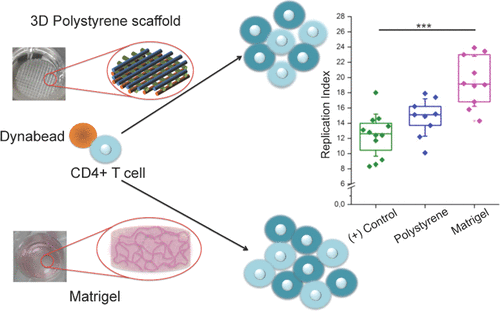
Scientists of NANBIOSIS U6. Biomaterial Processing and Nanostructuring Unit, have recently pubished an article in the ACS Omega about the design 0f 3D platforms specific for T cell culture to improve the current T cell expansion systems to introduce new in vitro models and facilitate the broad use of ACT in the clinics.
Adoptive cell therapy, i.e., the extraction, manipulation, and administration of ex vivo generated autologous T cells to patients, is an emerging alternative to regular procedures in cancer treatment. Nevertheless, these personalized treatments require laborious and expensive laboratory procedures that should be alleviated to enable their incorporation into the clinics. With the objective to improve the ex vivo expansion of large amount of specific T cells, we propose the use of three-dimensional (3D) structures during their activation with artificial antigen-presenting cells, thus resembling the natural environment of the secondary lymphoid organs. Thus, the activation, proliferation, and differentiation of T cells have been analyzed when cultured in the presence of two 3D systems, Matrigel and a 3D polystyrene scaffold, showing an increase in cell proliferation compared to standard suspension systems.
Article of reference:
Eduardo Pérez del Río, Marc Martinez Miguel, Jaume Veciana, Imma Ratera, and Judith Guasch. Artificial 3D Culture Systems for T Cell Expansion . ACS Omega 2018 3 (5), 5273-5280. DOI: 10.1021/acsomega.8b00521








